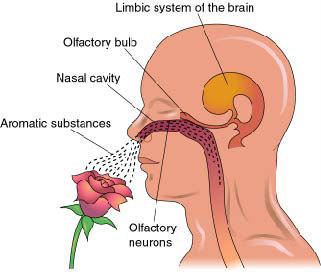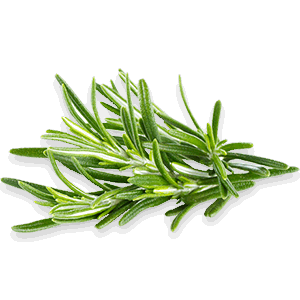Aromatherapy
For Alzheimer’s Disease

By John Schmid on August 5, 2010
Can Aromatherapy Help Alzheimer’s Disease?
There
has recently been an upsurge in attention over the use of aromatherapy for Alzheimer’s disease. Several essential oils are proving effective for treating symptoms of dementia including anxiety, sleep problems, and even memory and cognitive function. Some recent findings: Lavender and lemon balm reduce anxiety and agitation. Peppermint can stimulate the appetite and support memory. Bergamot calms mood, fights depression, and aids sleep. Rosemary actually improves memory and cognition. But I believe that research into the benefits of aromatherapy for Alzheimer’s is just beginning.
“Aromatherapy” is a somewhat misleading term, since it is not necessarily the aroma of the oils used that creates the desired effect, rather a direct effect that the oils have on the body, whether through contact with the lungs (breathing), or the skin (massage or body oils and lotions). Aging and dementias can both diminish the olfactory sense, but since a direct pharmacological effect of the oils is responsible for the healing effects, a diminished sense of smell should not be a concern when considering aromatherapy.
Some Essential Oils for Aromatherapy
for Alzheimer’s
for Alzheimer’s
- Lavender – One of the essentials most used in studies of the effects of aromatherapy on AD. Traditionally, lavender is said to be calming and to balance strong emotions. It is also antidepressant and useful in cases of insomnia. Use it in the evening to promote better sleep, or any time of day to promote better mood.
- Lemon Balm – Another essential oil that has been studied in connection with Alzheimer’s disease and dementia, (Melissa officinalis) helps to calm and relax. It is helpful to those suffering from anxiety and insomnia. Melissa is probably the most studied of the essential oils for its affect on people who have Alzheimer’s disease, and it is very likely one of the most effective, but it is more costly than other oils that we offer.
- Peppermint – Used to both stimulate the mind and calm the nerves. It is said to rectify absent-mindedness; and studies show it improves memory. What could be better? Use it the morning to energize the patient and stimulate appetite.
- Rosemary – Stimulating and uplifting. Stimulates body and mind. A recent study by Mark Moss and Lorraine Oliver reported some compelling evidence that exposure to rosemary oil improves cognitive performance in both speed and accuracy measures.5 Furthermore, they found that higher concentrations of 1,8-cineole, the active part of rosemary essential oil, resulted in higher performance levels; this in addition to the improvement in mood they reported in the same study.
- Bergamot – Mood elevating, calming, and balancing. Relieves stress, anxiety, and mild depression. Refreshes. Relieves insomnia.
- Ylang Ylang – This oil can be relaxing and stress relieving, but at least one study has shown it can actually impair memory, so use with caution.
There are others that can have some benefit to people with dementia, but these are the ones with the most clinical support. Other oils have general benefits. Effects that can improve anyone’s quality of life. Ginger (the oil as well as the spice and the fresh root), for example, is good for digestion and appetite. Oregano oil is anti-microbial, antibacterial, anti-parasitic, anti-viral, and anti-fungal. Many essential oils reduce inflammation including frankincense, chamomile, eucalyptus, thyme , and sandlewood. Read more about the possible connection between inflammation and Alzheimer’s disease here. And see our complete line of essential oils for
Alzheimer’s and Dementia.
Using Aromatherapy Oils
Essential oils are most commonly inhaled and absorbed into the
linings of the lungs. They can also be applied directly to, and absorbed
through, the skin. Care should be exercised when using and
administering essential oils. Only diluted oils should be applied
directly to the skin. Bath oils, facial oils, and skin care products
containing essential oils are all appropriate for this purpose. Pure
essential oils can also be diluted with carrier oils, also available on
request.
Essential oils are used in various ways. Inhalation is
the most common and obvious: For this we offer several diffusers which
disperse the oil into the air to be breathed. Sometimes the effects of
the oils are more pronounced when they are absorbed through the skin³.
Lavender is a good example. Massage a few drops into the hands before
bedtime to promote sleep. Lotions and “carrier” oils that are infused
with essential oils are also a comforting way to administer their
benefits. A carrier oil can be any non-volatile oil derived from
vegetarian sources. It is preferable to use an oil with a neutral aroma
so as not to conflict with the essential oil. (“Neutral” does not
necessarily mean the oil has no smell. Choose an oil with an agreeable,
natural smell.) Many oils are good for the skin. We recommend organic,
unrefined versions of coconut oil, jojoba oil, and sweet almond oil.
There are others that work well, and non-organic versions can be used.
Please stay away from anything that is refined or hydrogenated.
Some methods of use and application suitable for aromatherapy for Alzheimer’s disease:
- Ambient Diffusion—Diffusers disperse essential oils into the air, either in a cool mist or by gently warming.
- Massage —Massage combines the therapeutic benefit of touch with those of essential oils. Massage relaxes and improves muscle tone, improves blood circulation and lymph flow, essential to the body’s immune response. Massage oil is 24 drops of essential oils (oils can be combined if desired) in 2 ounces of an organic carrier oil or unscented lotion.
- Body Oil—Best used after a shower or bath, body oils condition the skin, as they deliver aromatherapy treatment through skin absorption. Body oil can be prepared by mixing 6-10 drops of the desired essential oil in 2 ounces of an organic carrier oil, like Grapeseed or Sunflower oil.
- Bath—A good way to relieve muscular and emotional stress while soothing skin conditions. Use 8-10 drops in a full tub of warm water.
- Direct Inhalation—Put 2 or 3 drops of essential oil on a tissue and inhale through the nose. Pause, and repeat as desired.
- Foot Bath—2-4 drops of oil in a tub of water or a Massaging Foot Bath is a perfect way to soothe tired feet. Cool water is invigorating and energizing, warm water is relaxing. Soak feet for ten minutes and pat dry.
- Compress—Add 2-5 drops of oil to water (warm or cool) in a bowl or basin. Stir well, and soak a cloth in the water. Wring the infused cloth and apply to the skin.
- Misting is a convenient way to impart the aroma of an essential oil into the air. Add 20-30 drops of oil to 8 ounces of water in a mister bottle. Shake vigorously and mist the air.
- Body Lotion—add a few drops of oil to an unscented lotion.
Precautions
When Using Aromatherapy
When Using Aromatherapy
Essential oils are highly-concentrated and should always be used with caution. When using essential oils on the skin, always dilute the liquid to avoid severe skin sensitivities. When using a new essential oil for the first time, test it on a small area of skin to check for irritation. Only a small amount, usually 1 to 2 drops, of oil is needed to see results.
Alzheimer’s disease is the most common form of dementia and can cause many side effects, including loss of brain function as the disease progresses. While aromatherapy cannot reverse the effects of Alzheimer’s, it has been proven successful in managing its symptoms.
What is Aromatherpy?
The term aromatherapy was first used by René-Maurice Gattefossé, a French chemist who discovered, purely by accident, that lavender oil had
a healing effect on burns. Since then, many have studied the healing effects of different essential plant oils.
Aromatherapy is the use of volatile plant oils (essential oils) to improve psychological and physical health and prevent disease, and to
affect mood. These oils are distilled from different parts of plants and contain the essence of the plant. Plants and herbs have a long and
lustrous history in relation to our health. They have long been used for their healing properties, in herbal medicine, in our food, and as
aromatherapy. Modern medicine has derived many of its most potent and important medicines from plants.
Some Precautions When Using Aromatherapy Oils
Essential plant oils are relatively safe if certain precautions are
followed. If you have a question or a concern about the proper or safe
use of any aromatherapy product, please call (our phone number is in our
contact page). Some general guidelines follow:
- If you, or the person for whom you are considering aromatherapy, is under the care of a physician, consult that physician before introducing essential oil therapy.
- Never put an undiluted essential oil in direct contact with the skin. There are exceptions to this directive, but only under direct supervision of a trained aromatherapist. (Dilute with a carrier oil.)
- If there is an allergic reaction to any essential oil, discontinue the use of that oil immediately.
- Every essential oil has its own unique properties. Precautions for particular oils are listed with that oil in the store.
- If you are using a candle diffuser that was purchase elsewhere, be careful as you always would with an open flame.

Following is a small sampling of recent research that has investigated the effects of aromatherapy for Alzheimer’s.
- Mark Moss, Steven Hewitt, Lucy Moss, Keith Wesnes; MODULATION OF COGNITIVE PERFORMANCE AND MOOD BY AROMAS OF PEPPERMINT AND YLANG-YLANG; International Journal of Neuroscience, Vol. 118, Iss. 1, 2008
- Ballard CG1, O’Brien JT, Reichelt K, Perry EK; Aromatherapy as a safe and effective treatment for the management of agitation in severe dementia: the results of a double-blind, placebo-controlled trial with Melissa. J Clin Psychiatry;m2002 Jul;63(7):553-8. The study tested Melissa officinalis (lemon balm) extract against a placebo to determine its effect on patients with mild to moderate Alzheimer’s. The lemon balm improved cognitive functioning significantly better than the placebo.J Clin Psychiatry. 2002 Jul;63(7):553-8.
- Ballard CG1, O’Brien JT, Reichelt K, Perry EK.; Aromatherapy as a safe and effective treatment for the management of agitation in severe dementia: the results of a double-blind, placebo-controlled trial with Melissa. J Altern Complement Med. 2004 Jun;10(3):431-7.
- Daiki JIMBO,1Yuki Kimura,Miyako Tamiguchi, Masashi Inoue and Katsuya Urakami; Effect of aromatherapy on patients with Alzheimer’s disease. Psychogeriatrics 2009; 9: 173–179.
- Mark Moss, Lorraine Oliver; Plasma 1,8-cineole correlates with cognitive performance following exposure to rosemary essential oil aroma.Therapeutic Advances in Psychopharmacology, 2012 Jun; 2(3): 103–113.
*


No comments:
Post a Comment